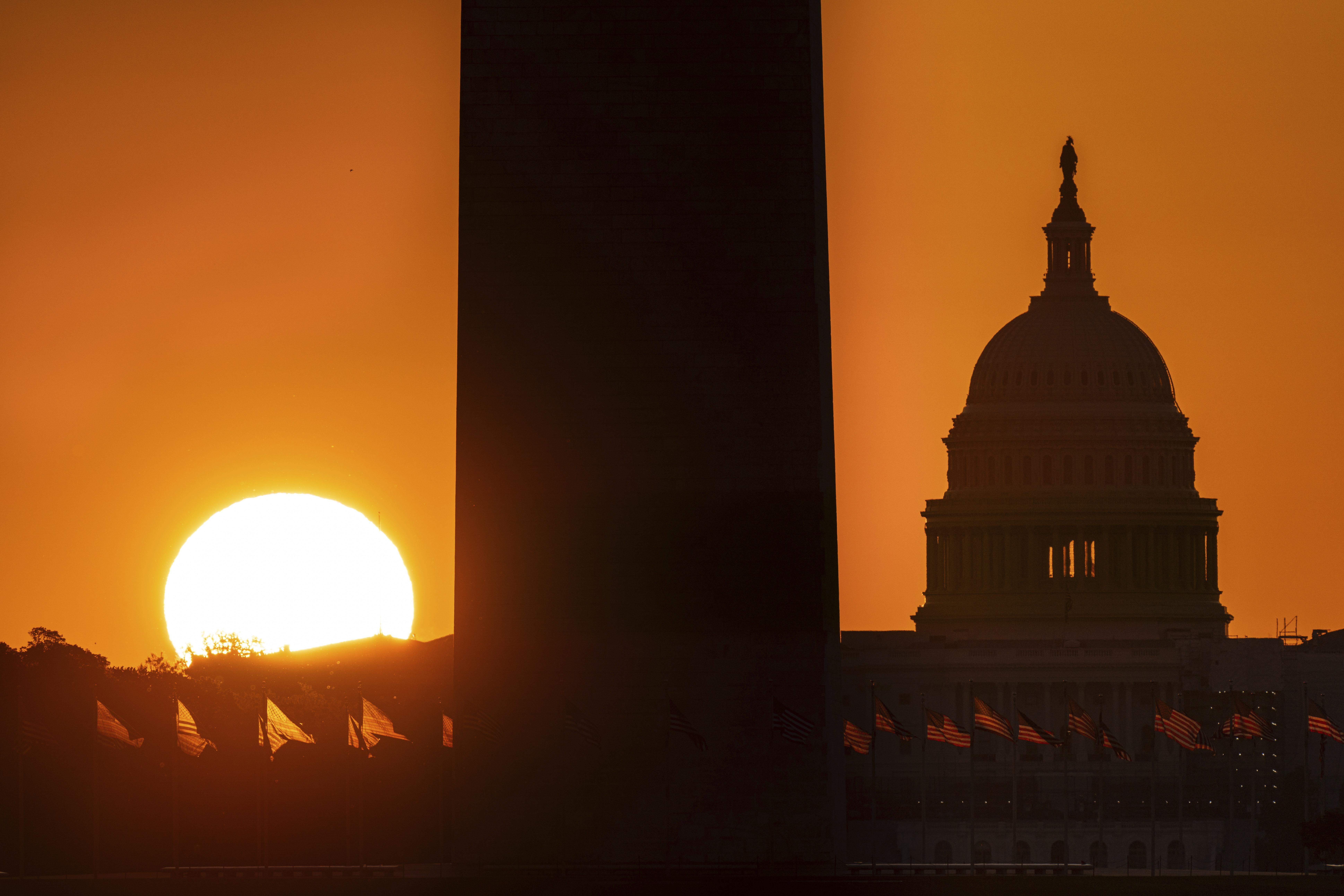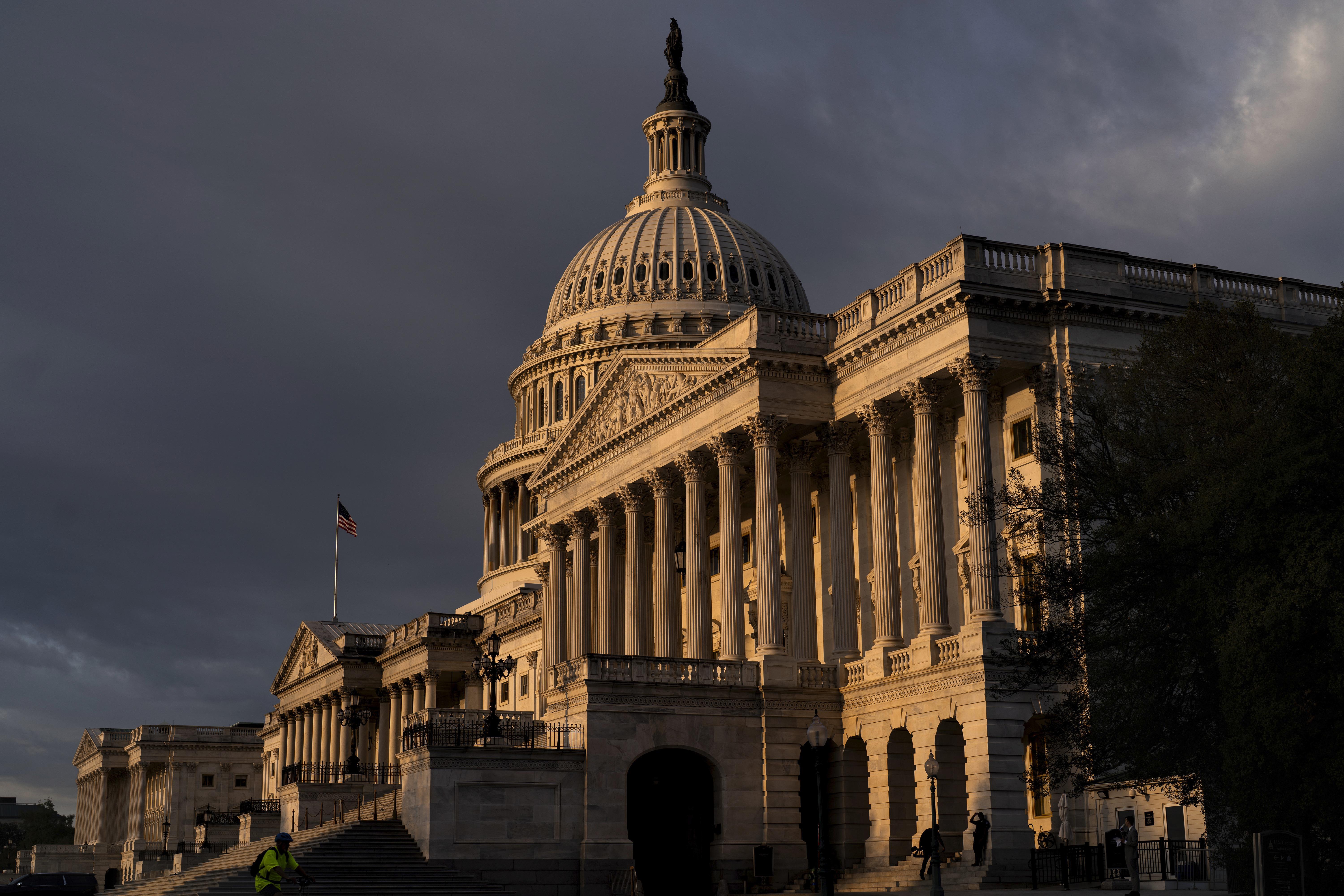 Sunrise behind the Washington Monument and the US Capitol Building illuminates the US flags on the National Mall early Saturday morning, Sept 16, 2023, in Washington. (PHOTO / AP)
Sunrise behind the Washington Monument and the US Capitol Building illuminates the US flags on the National Mall early Saturday morning, Sept 16, 2023, in Washington. (PHOTO / AP)
BEIJING - The US House of Representatives canceled a scheduled vote Tuesday on a temporary government funding bill, further hiking shutdown risk as the Sept 30 deadline approaches, while the national debt breaks $33 trillion.
The canceled vote was for a short-term stopgap spending bill, known as a "continuing resolution" that could keep the government running until Oct 31, giving Congress more time to enact full-scale appropriations for 2024.
Two groups of House majority Republicans -- hardline House Freedom Caucus and moderate Main Street Caucus -- reached the tentative bill on Sunday, which intends to tighten border security, cut federal spendings excluding those on defense, veterans, or disaster relief by 8 percent, and stop increasing aid to Ukraine, in exchange for 1 percent of overall spending cut.
Yet at least a dozen hardline members came out against the deal or expressed skepticism.
In case of failure, thousands of government employees would stop working, with business interrupted and the economy dragged down. Goldman Sachs estimates that every week of governmental shutdown kills the US GDP growth rate by 0.15 percent
Rep Matt Gaetz called the tentative deal "a betrayal of Republicans" on social media. Rep. Majorie Taylor Greene posted: "I'm a NO!" on Tuesday.
House Speaker McCarthy urged Republicans to pass the continuing resolution, warning against political fallout in case of a shutdown.
ALSO READ: US Congress faces spending, impeachment brawl
"I've been through shutdowns and I've never seen somebody win a shutdown because when you shut down, you give all your power to the administration," McCarthy said in a Fox News interview on Sunday.
The US Chamber of Commerce issued a memo Monday to the business community, warning of the negative impact a prolonged shutdown can have on the country's economy.
"From passports and permits to clinical trials and contractors, a well-functioning economy requires a functioning government," the chamber wrote.
Congress has so far enacted none of the 12 appropriations bills setting discretionary spending levels. The House has just five days left in session before the Sept 30 deadline to avert a shutdown.
ALSO READ: US soldiers in S. Korea caught smuggling drugs
In case of failure, thousands of government employees would stop working, with business interrupted and the economy dragged down. Goldman Sachs estimates that every week of governmental shutdown kills the US GDP growth rate by 0.15 percent.
The last federal government shutdown happened between December 2018 and January 2019, which cost Americans $3 billion, according to the Congressional Budget Office.
The current deadlock occurs amid the deteriorating US fiscal crisis. Credit ratings agency Fitch on Aug 1 downgraded the US government's credit rating from the top-notch AAA to AA+ over concerns about "growing debt burden" and "an erosion of governance."
 The Capitol in Washington, is seen at sunrise, Sept 13, 2023. (PHOTO / AP)
The Capitol in Washington, is seen at sunrise, Sept 13, 2023. (PHOTO / AP)
US President Joe Biden signed the Fiscal Responsibility Act of 2023 into law to avoid a historic default on government debt, which reached in January its debt limit of $31.4 trillion, more than 120 percent of its annual GDP.
ALSO READ: US shutdown looms as House speaker faces crucial test
The exploding US national debt poses increasing risks to the global finance system.
In less than five years, the debt expanded from 2 trillion dollars in September 2017 to 30 trillion in February 2022. Goldman Sachs estimates it would exceed $35 trillion by January 2025.


